
Saying goodbye to Sar makes me sad
N 48°55'433'' E 103°39'440''
Day: 411
Sunrise:
06:30
Sunset:
19:35
Total kilometers:
2468
Soil condition:
Grass
Temperature – Day (maximum):
9 °C
Temperature – day (minimum):
8 °C
Temperature – Night:
3 °C
Latitude:
48°55’433”
Longitude:
103°39’440”
Maximum height:
1380 m above sea level
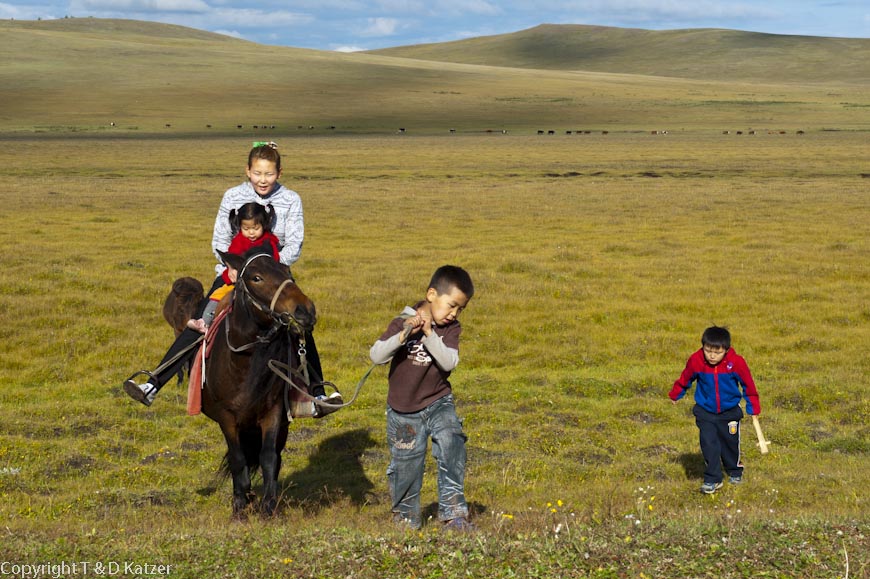
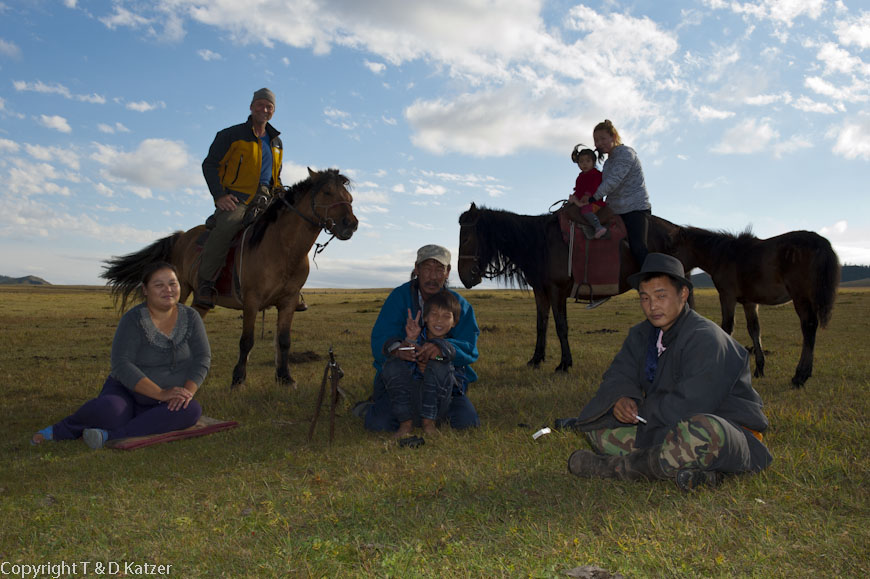
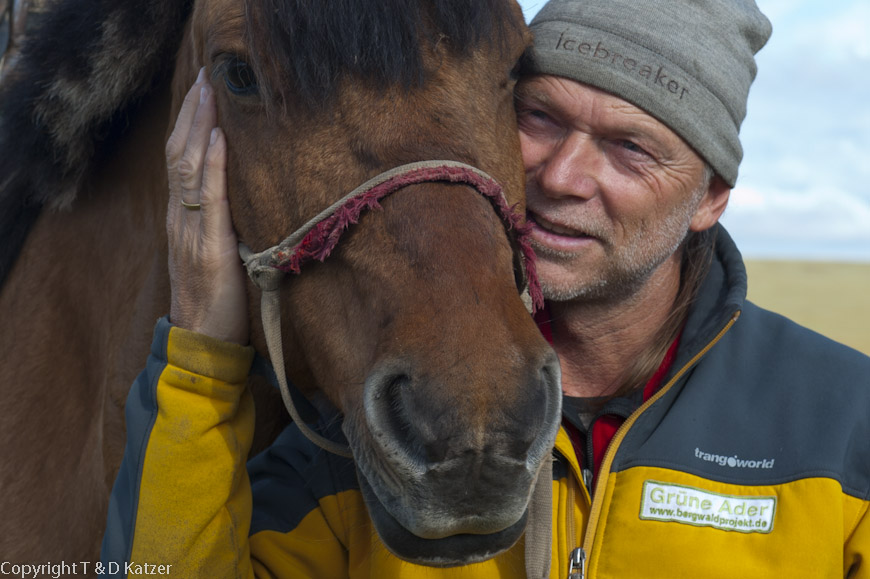
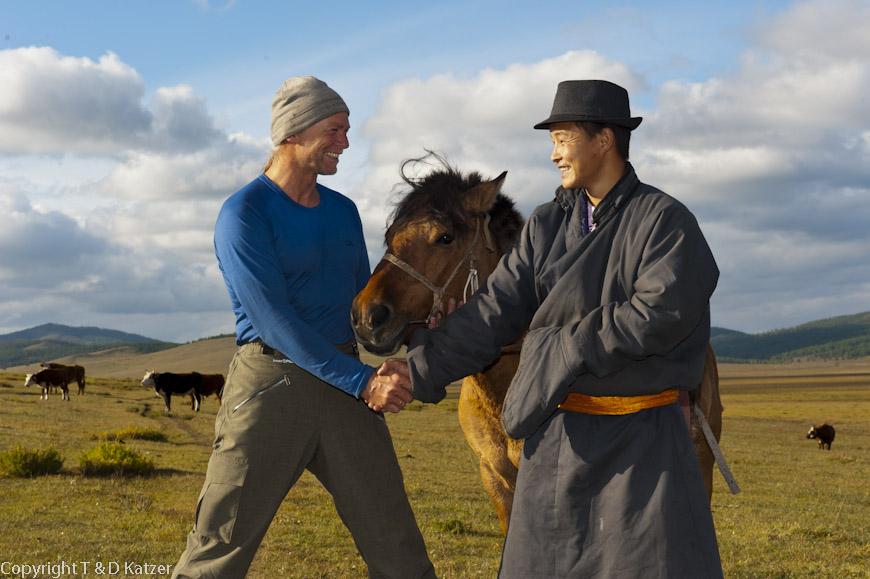
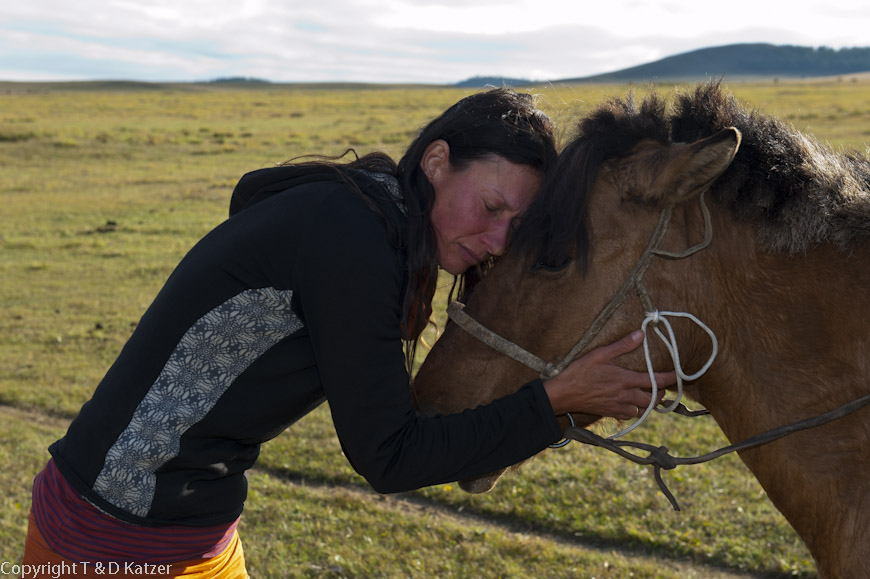
In the morning, another of Ilhauchauu’s relatives arrives on horseback to catch the runaway again. Around midday, Bilgee’s niece Tzolaa appears with her two-year-old daughter Enchgin, her seven-year-old cousin Toogi, her fifteen-year-old cousin Ganchimeg, Tanja, who stayed with Tzolaa last night, Bilgee’s eleven-year-old son Husle and a young man named Mogi. They tumble out of the tiny car like ripe windfalls. “Unbelievable! How did you all find room in there?” I ask Tanja. “You know the Mongolians are world champions in mediation. We even had a lot of fun. The children were always talking about the horses and bragging about them. Husle said: “My father bought Naraa and Tuya. Naraa is the calmest horse in the world and with Tuya I will take part in the Nadaam next year and win first place. My grandfather bought Sar, Sar is the best horse of the expedition. It is Denis’ horse. A real expedition horse. It can do anything, ride over steep mountains and swim through raging rivers, replied Tzolaa’s cousin Toogi with great pride. And so it went for the whole trip. The funniest part was when Mogi joined in the children’s conversation and wondered why all the horses had Mongolian human names. And the dog is called Mogi, said Tzolaa, and we all burst out laughing.” “The horses will have a good time with them. That’s obvious. But what interests me is how did you spend your first night in civilization? Was it a shock after more than a year in a tent, yurt and tepee?” “Bilgee’s family welcomed me with open arms and treated me like I was a princess. It was just wonderful. They even let me take a shower.” “Showers? Oh man, now I’m getting really jealous.” “You don’t need to. The water came out of the tap cold.” “Cold? Oh dear. You must have turned to ice?” I ask because the water in this country is almost always extremely cold if you don’t heat it up. “After the first few seconds of shock, it wasn’t too bad. But back to your question. Yes, it was strange to sleep in a house even though it was a log cabin. They have flat screen TVs, computers, technical kitchen appliances of all kinds. Somehow it really was a shock. I’m happy when we leave the wilderness and steppe but I’m not sure if I can or want to get used to the modern fast life of the western world.” “I know. I can’t even think about the stress of the consumer world. We have to try to make the transition to the other world as smooth and slow as possible. We still have time. Let’s just approach it carefully,” I reply.
The children use the afternoon to ride Naraa and Sar. They laugh and cheer and can’t get enough of it. “Denis?” “Yes?” “We have a little problem,” Bilgee interrupts my positive thoughts. “And that would be?” “Tzolaa doesn’t have any money to buy Sar.” “Oh?” “They definitely want Sar. Tzolaa’s husband’s father needs the horse to collect his sheep. He has to sell a cow first to have enough money. After that, he’ll give you the money.” “Fine. And what’s the problem?” “Mogi is here to collect sar today.” “Today?” “Yes. He’s going to ride Sar to Erdenet. The family lives in yurts on the outskirts of the city. They need Sar. They can use him to drive the cow to market. As soon as the cow is sold, you’ll get your money. I know that you only hand over a horse to its new owner when he has the money in his pocket. But you can trust my family.” “Already today? I wasn’t expecting that. Did you actually want to take a few more pictures with me and my horse?” “You can do that. The sun is shining and Mogi will wait until you’ve finished taking photos,” Bilgee suggests.
Although we have often been ripped off in Mongolia, it is still important to remain open and trust. That’s why we agree to give Bilgee and his family Sar. After we have taken a few more pictures, I hand Sar over to Mogi. Without much ado, he swings into the saddle and gallops off with my horse. Until he is swallowed up by a rise in the ground, I look after my sar. I have never had such an excellent, loyal and well-behaved mount on any of our expeditions. I can feel the tears of an unforgettable and irretrievable time rolling down my cheeks. Saying goodbye is harder than I expected. Once again, an essential part of this extraordinary journey is heading towards its new destination.
Immediately after Mogi has disappeared with Sar, Tzolaa and her children also set off on the return journey. Because today is Saturday, Bilgee’s son Husle is allowed to stay in camp until tomorrow evening. He is looking forward to spending the two days with his father.
In the evening we all sit together in the awning. The rain drums against the canvas and strong wind presses under the snow flaps inside. The thermometer is at 3 °C. We talk about the day and Sar’s new home. “I thought Tovuu was going to buy Tenger, but he’s not interested,” says Bilgee suddenly. “Oh, that’s a shame. I was sure we’d completed the horse sale today,” I reply disappointedly, as we were sure we’d also sold Tenger to Bilgee’s family. “I thought so too. Now we have to look for a new interested party,” he reflects. “We should ask Ilhauchauu. He was interested in all the horses. He will definitely buy Tenger,” I am convinced. “Can be good. And if he doesn’t take it, I’ll buy it. “You?” we ask in amazement. “Yes. I will use Tenger for hunting. I need a good mount and Tenger is good, even very good.” “And how will you pay for him?” “I can give you the 650,000 tugrik (€394) next month.”
Although Tenger would have a very good home with Bilgee and he could stay together with his beloved Naraa, I wonder how Bilgee wants to raise the money. “We’ll sell Tenger to you for 500,000 tugrik. (303,- €) If Ilhauchauu takes him, we’ll stick to the price we’ve already given him,” I decide. “That’s very kind of you. If Ilhauchauu takes him, I can take my time earning money. I will then buy Tenger back from him next year.” “But then you’ll have to pay more because we’ll sell him for more?” “Don’t worry about that. Ilhauchauu loves to eat marmot meat. I’m one of the few hunters in the region. I can get anything I want from him in exchange for marmots.” “That’s good,” I say with satisfaction, because Bilgee is giving us the chance to sell Tenger at a better price.
Before we get into our sleeping bags, we put the walking poles back under the canopy as supports. This allows Bilgee to watch the horses Naraa and Tenger, who are staked out in front of the tent. Although there is no horse theft here, Bilgee and we prefer to play it safe and not lose our horses in the last few days. “You never know. Two years ago, my good rifle was stolen from my yurt,” says Bilgee.
“Ptschscht!”, an unfamiliar noise snaps me out of my sleep. Startled, I pull up the zipper of the inner tent and let the beam of my headlamp glide into the damp night. The horses are dripping with wetness right in front of our tent. “Everything’s fine,” I think with relief. Then I let the beam of light flit over Bilgee and Husle, who are lying on the ground in the awning right in front of me. Startled, I realize that the two of them are sleeping in a lake. Only now do I realize why. A large pool of water has formed on the exposed canopy and it has collapsed under its weight. At least ten liters of water sloshed over Bilgee and his son’s sleeping bag and Deel in this way. I get up, grab a dry cloth and wipe away the water. It takes 15 minutes for the lake to disappear and the canopy to be erected again. I spread a dry horse blanket over Bilgee and Husle so that they don’t start to freeze at night because the wetness has penetrated their blankets. Tired, I lie down again and wonder what a deep sleep the two of them are having. They neither noticed the water falling on them nor my work. Thieves could have stolen an entire herd.
We look forward to your comments!

